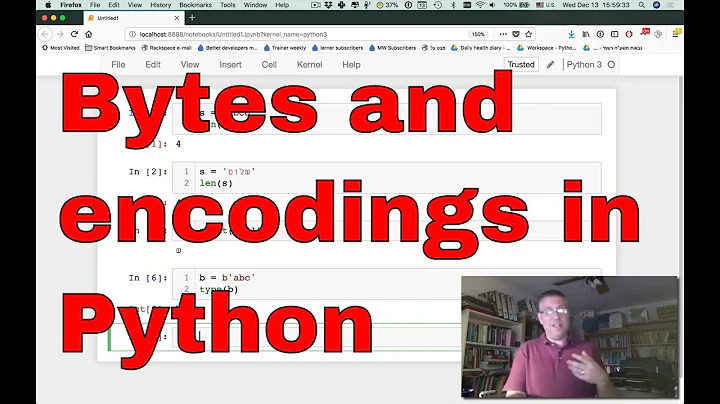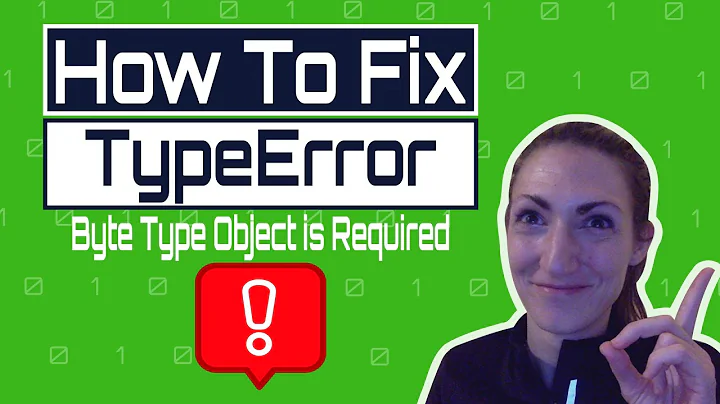chr() equivalent returning a bytes object, in py3k
Solution 1
Consider using bytearray((255,)) which works the same in Python2 and Python3. In both Python generations the resulting bytearray-object can be converted to a bytes(obj) which is an alias for a str() in Python2 and real bytes() in Python3.
# Python2
>>> x = bytearray((32,33))
>>> x
bytearray(b' !')
>>> bytes(x)
' !'
# Python3
>>> x = bytearray((32,33))
>>> x
bytearray(b' !')
>>> bytes(x)
b' !'
Solution 2
Try the following:
b = bytes([x])
For example:
>>> bytes([255])
b'\xff'
Solution 3
In case you want to write Python 2/3 compatible code, use six.int2byte
Solution 4
Yet another alternative (Python 3.5+):
>>> b'%c' % 65
b'A'
Solution 5
>>> import struct
>>> struct.pack('B', 10)
b'\n'
>>> import functools
>>> bchr = functools.partial(struct.pack, 'B')
>>> bchr(10)
b'\n'
Related videos on Youtube
zwol
If you want to know about me, please see my website: https://www.owlfolio.org/ . DO NOT CONTACT ME WITH ANY SORT OF JOB OFFER. The policy of treating comment threads as ephemeral and "not for extended discussion" is wrong, is actively harmful to the community, and I will not cooperate with it in any way. Using people's preferred pronouns is basic courtesy and it is reasonable for the code of conduct to insist on it. (I go by "he", for the record.)
Updated on April 12, 2020Comments
-
zwol about 4 years
Python 2.x has
chr(), which converts a number in the range 0-255 to a byte string with one character with that numeric value, andunichr(), which converts a number in the range 0-0x10FFFF to a Unicode string with one character with that Unicode codepoint. Python 3.x replacesunichr()withchr(), in keeping with its "Unicode strings are default" policy, but I can't find anything that does exactly what the oldchr()did. The2to3utility (from 2.6) leaveschrcalls alone, which is not right in general :((This is for parsing and serializing a file format which is explicitly defined in terms of 8-bit bytes.)
-
zwol over 13 yearsI get a little twitchy about throwing around scratch arrays but probably I shouldn't. It does the job, anyway.
-
malthe about 11 years@Zack: You could use
bytes((255, ))as a variation. -
Guido U. Draheim over 9 yearsbytes((255,)) in Python2 will NOT give you b'\xff' ... it returns '(255,)' instead.
-
jfs almost 8 years@GuidoDraheim2013: it is Python 3 code i.e., don't use
bytes([255])on Python 2, usechr(255)there. -
zwol almost 8 yearsI don't see why that would be better than Guido's answer, particularly if I have no other need for
six. -
 youfu almost 8 years@zwol: For Python 3.2+,
youfu almost 8 years@zwol: For Python 3.2+,int2byte = operator.methodcaller("to_bytes", 1, "big"). According to the comment, this is about 2x faster thanbytes((...)). Anyway,int2byte(x)looks better thanbytes(bytearray((x,)))for me. -
zwol almost 8 yearsSpeed is good, but in the thing that provoked the original question, no dependencies outside the standard library was an overriding concern.
-
Perkins over 7 years
bytestakes atuplefor a constructor directly, so you can just usebytes((x,)). Only need to usebytearrayif you want it to be mutable. -
zwol over 5 yearsAnnoying that
b'{:c}'.format(65)doesn't work as well, but thanks, this could be quite handy for the thing I originally wanted this for (and never got around to finishing). -
 martineau over 5 years@malthe:
martineau over 5 years@malthe:bytes((255, ))is still creates a scratch array.









